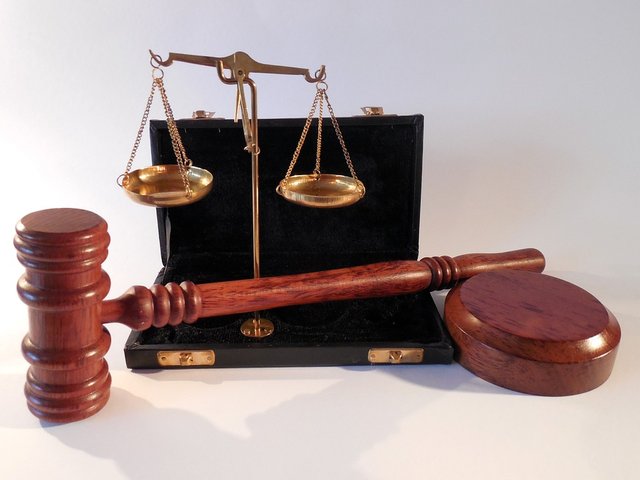SLC22-W1 / Basic Notions of Law
AssalamuAlaikum & Greetings Everyone!
AssalamuAlaikum & Greetings Everyone!
It's me @amjadsharif
From #pakistan
From #pakistan
.png)
Q.1 - Say in your own words and based on what was explained in class: What is law?Considering the explanations given in class, according to the law and the laws of your country, I pointed out two examples of "Objective Law" and two examples of "Subjective Law".
What is Law?

pixabay
Legal system is a set of activities, standards which are set and upheld by the state in order to control persons’ activities and prevent social vices. It makes justice, defends rights of people and solve conflicts as it describes allowed behavior. Pakistani laws are composed of religious laws based on the holy Islamic Sharia laws, Constitution of Pakistan and through numerous legislative enactments. These laws relate to the public and the private sphere of people’s lives, and they are the key to the effective work of society.
Objective Law
As he was arguing, Objective Law is the type of law that applies to everyone no matter his/she personal conditions or the situation that he/she is facing.
Example 1: This paper focuses on the Constitution of Pakistan (1973).
The constitution of Pakistan plays the role of a constitution which is the highest law of the country. For example, article 25 provides equal protection of the law saying ‘All citizens are equal before the law and shall be accorded equal and impartial protection by the law.’ This makes it possible for none of the people to be discriminated on basing a certain legal procedures that are bestowed on them.
Example 2: Traffic Laws

pixabay
They include exiting rules and regulation in the places like; Speed control and child safety belts and seat restraint rules. All these laws apply to all forms of vehicles irrespective of the social, economic or political status of the users. For example, the Motor Vehicles Ordinance of 1965 provides measures for violation, for example, without a license, or ignoring the red signal.
Subjective Law
Subjective Law relates to laws that are enforced as per individual circumstances, and the relations of contracts.
Example 1: Inheritance Laws (Islamic Law of Succession)
Succession laws in Pakistan are framed under the Pakistan Shariah, and decisions are based on Shariah laws; the distribution of the properties depends on whether the deceased leaves behind a husband/ wife and/or children/others. For an instance, a son gets a double portion of what a daughter is given as an inheritance. These rules are somewhat arbitrary because they depend on certain relatedness and family members of the deceased.
Example 2: Employment Contracts
Particularly, employment agreements define particularities such as wages, incentives, working conditions, etc., in accordance with the particular employee. For example, one employee may be given special privileges like extra house or transport allowances depending with the contract thus making the terms contentious due to employment contracts.
Case Study 1
In the consideration of the LAW OF PAKISTAN, once again the differentiation of Objective Law and Subjective Law can be made to this incident of a traffic violation.
Objective Law in Pakistan
The second meaning of the term is an objective law which as the name suggest means the legal prescription that operates universally. According to the Motor Vehicles Ordinance, 1965 which exists in Pakistan, rules for traffic and controlling signal are clear that signal light must be followed by every driver on road. Constitution of a traffic light entails a violation of these laws and offenders are liable to fines or penalties under that provision.
- Example in the Case:
In this case, the driver violated a red sign of the traffic light. This act is unlawful according to Objective Law – Motor Vehicles Ordinance and the law does not allow traffic officers to compromise on penalty.
Subjective Law in Pakistan
The legal standards that take into account part, intent, circumstances and situations of a particular person or an individual engaging in participating are regarded as Subjective Law. Here the driver uses an excuse of having to run the red light due to him having to get his sick son to the hospital. It is possible to mitigate such circumstances under the law of Pakistan. Thus, the law does not justify contraventions on grounds of emergency; however, an officer in law enforcement or a court can take such aspects into consideration as to their decision concerning the penalty to be executed.
- Example in the Case:
For this reason, justification the driver uses– his son is in critical condition in the hospital— falls under Subjective law. This may bring an influence on the officers decision making process as to whether to let the offender of go easy by only warning them rather than fining them based on the evidence or the officers own judgement.
In Accordance with Pakistani Law
Objective Law states that the driver has, in some way, violated a traffic regulation, and that was in running the red light.
Subjective Law permits the examining of circumstances, for example a valid objective reason including serious health condition.
Some of these two aspects are usually left for the traffic police officer while in some other occasions, it comes to the legal hands of the court. But the law in general does not allow one to get carried away, saying that safety of the public should not be endangered and from this point of view drivers are also supposed to behave reasonably.
Subjective Aspect
The Act also also and support the family of the victim The Act also provides compensation and support for the victim’s family. The type and quantity of this compensation vary depending on ad hoc factors of the case and the financial feasibility of the family. That is why the application of the concept is largely subjective.
Q.2 - Based on what you have explained in class, make a comparison and according to the law of your country. Give an example of a law and an example of a norm.
Laws vs. Norms: A Comparison with Examples from Pakistan
In social relations, there are legal and moral rules within which the actions of people occur, and which coordinates them. Despite their function to control people’s behavior, they are distinguished by their format, compliance, and consequences. A law is an official regulation set up by a government while a norm is an unofficial regulation promulgated by culture and practice.

pixabay
Laws
Rules are legal provisions developed by state power to sustain law and order in a society. All are scripted, documented and implemented by organizations like the courts of law and the police. An infringement attracts specific remunerations, fines with or without imprisonment by and large based on the nature of the infringement.
Example of a Law in Pakistan:
There is a few lists of laws in Pakistan and one of the significant one is The Prevention of Electronic Crimes Act (PECA), 2016. It enshrines a number of cybercrimes such as cyber bullying, Identity theft; sharing of prohibited content without consent etc. For example if a person shares another person’s naked pictures to a social network without consent of the owner of the pictures then that person is in violation of PECA. According to the law, the offenders exposed to imprisonment or fines as prescribed under the clauses of the law.
Norms
Customs involve conduct which is expected, but not prescribed by law, being part of a generally accepted culture or tradition. Such processes are not regulated by legal norms, but by the actions of people and their positive or negative feedback. Following norms creates acceptance and an individual feels that he is a member of the society if he does not obey norms, he will be criticized, rejected, or face other related consequences.
Example of a Norm in Pakistan:
Verbal respect to the elder members of society is something that is potentially hard wired into the Punjabi Pakistani community. Things like say ‘As-salam u Alaikum’ to elder or saying ‘stand no need to sit’ are done often. Breaking such norms may not necessarily lead to a legal trouble but this can lead to social censure or being considered as being rude in the society.
Case Study 2
This case involves two distinct types of violations: a legal infringement and a cultural infringement. Below is an analysis of each part:
1. Violation of the Law
Among many things, Mr. Juan Perez’s refusal to pay rent for 3 months is unlawful. Lease agreements are legal business documents recognized by civil law. That is why the nonpayment for rent by Mr. Juan is a violation of the contract. This would mean that legal measures could be taken which entail the landlord taking the tenant to court in an attempt to recover the unpaid rent or the eviction of the tenant from the premises.
- Legal Basis: Rental laws as well as the rental agreement form are the common ways through which the tenancy makes is required to pay rent. Failure to pay can trigger things such as eviction, which is legal procedure to remove someone from property.
2. Violation of a Norm
By the rules of coexistence in the building, it is prohibited to keep four dogs in the apartment. This is an ethical violation not a legal one. Standard of behavior of inhabitants of a property is an enforceable code which is set and administrated by the owners of the several apartments or management of the building. These rules are not of legal tender but are legal for residents in the community if they form part of a legal contract.
- Normative Basis: Housing a pet contrary to the rules in the building implies the violation of some unspoken pact that is punishable by complaints, fines from the association overseeing the building’s affairs, or a request to rid the compound of the pets by Mr. Juan Perez.
Major Difference Between Law and Norm
- Law: Prescribed by state law carried through the court or legal processes with penalties for noncompliance.
- Norm: Imposed either voluntarily or by neighborhood, and repercussions that only affect the society or group in question.
In brief, Mr. Juan Perez is committing an offence for not paying rent and a breach of the_standard_ for allowing pets in a building where they are banned. Both actions can cause different accountability, The impact of legal responsibilities for tenants and the ways in which social norms are constructed when several people live together.
Q.3 - Explain in your own words what importance Comparative Law has for you according to what you have seen in class
What is Comparative Law?
Analyzing Various Legal Structures
Comparative law acts as a guide for any country and enables a legal system of different countries to be understood. By cross-jurisdictional examination of the legal rules, it is possible to identify that the legal systems, including the common law and civil law systems, Islamic law, and customary law, are influenced by the culture, history, and society of a country. This particular view makes one understand that there are so many otherlegal systems around the World.
Enhancing the laws meisten
The comparative law is a tradition that is favorable because it can help improve legal systems. This can be done by comparing legislation with the outcomes of other countries and filtering out what could be successful in their case. For instance, success of reforms as those related to environmental law or gender equality in one state can lead to similar actions in other states with the provisions taken into account.
Advocacy of Collaboration
As the world continues to become a global village comparative law is very important and valuable in enhancing cross nationals cooperation. Trade, Human rights or environmental laws all inform that one has to understand other nations’ legal frameworks in order to form positive international relations. Comparative law plays a function of drafting international treaty and solving cross legal issues to provide smooth cooperation in the international legal process.
Boosting Literate and Scholarly Comprehension
Comparative law has invariably much worth in legal studies because comparative legal studies can be a valuable source of discovering how laws develop in various cultural and historical environments. It enables academicians to pinpoint standard legal practice while comprehending their interfacing with local usualities. This essay research fits into this knowledge development of the law as a topical and evolving field.
Justice and Human Rights Promotion
Comparative law works hand in hand to enable the detection of the various shortcoming within individual legal systems particularly with regard to rights and freedoms of man. For instance, the countries intending to enhance the access to justice in case of various minorities can use samples of other countries. This aspect of comparative law helps in protecting fairness, equality and human rights on a larger demographic base.
Conclusion
Comparative law is an important area of knowledge that bolsters our legal awareness, encourages the introduction of novelties and deepens the cooperation of countries. By observing such systems, it is possible to create legal conditions which are acceptable to people of different culture and just for any person in the world. Because of the positions it takes in facing up to global concerns and advocating justice, comparative law is an indispensable instrument for contemporary legal and social change.
I invite here some of my friends @edgargonzalez, @jyoti-thelight, @kouba01, and @shabbir86 to participate in this engagement challenge. Thank You Teacher @anasuleidy & @elider11.
Thank You
